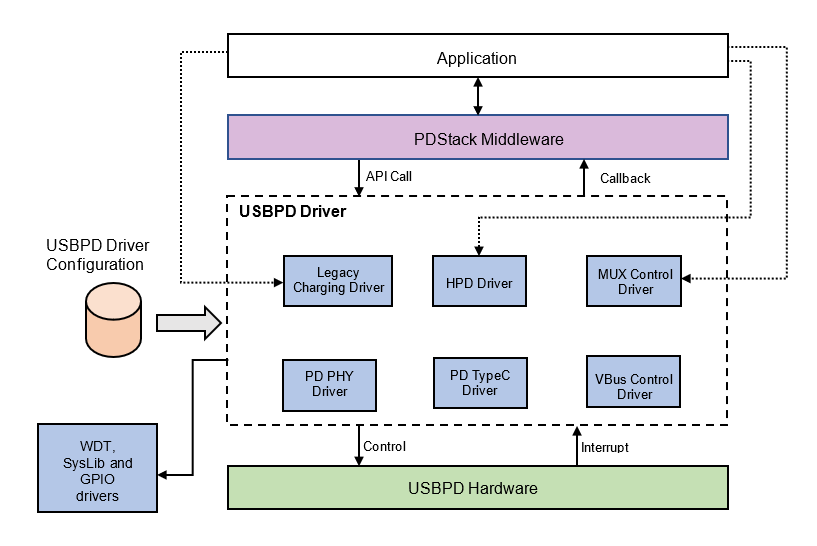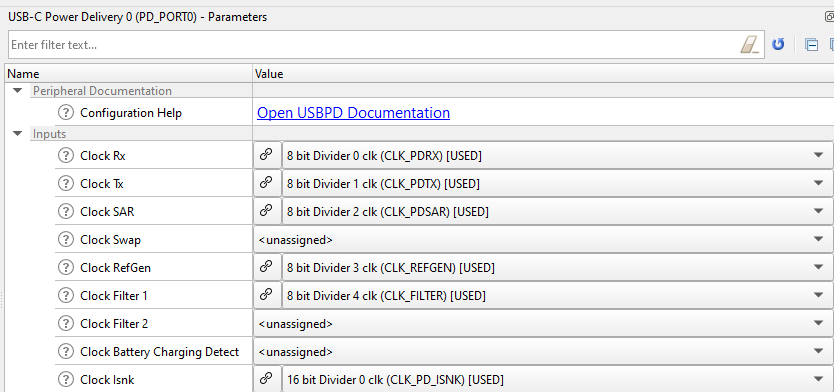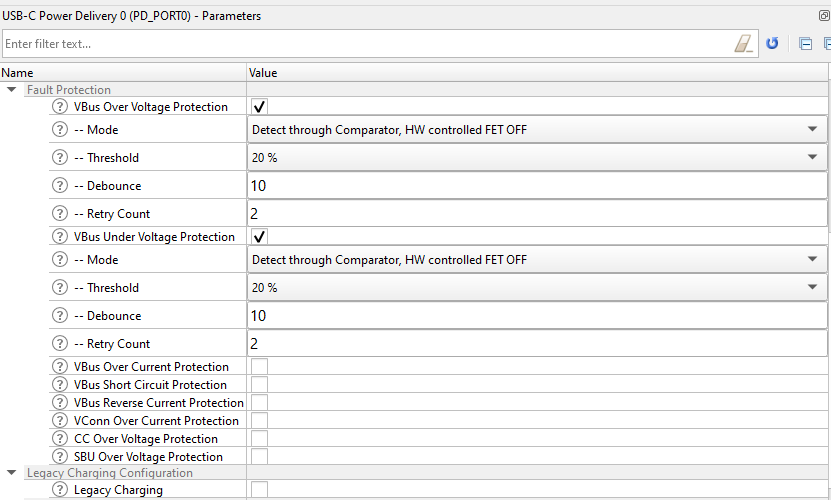The USBPD driver provides APIs to configure and access the M0S8-USBPD and MX-USBPD IP block on the EZ-PD PMG1 family of devices into a high-quality, versatile analog front-end for PD applications. More...
Modules | |
| Common | |
| USBPD driver common data structures. | |
| HPD (USBPD) | |
| USBPD Hot-Plug Detect driver. | |
| Legacy Charging (USBPD) | |
| USBPD Legacy Charging driver. | |
| MUX (USBPD) | |
| USBPD MUX Control driver. | |
| Phy (USBPD) | |
| USBPD Phy transceiver driver. | |
| Type C (USBPD) | |
| USBPD Type C driver. | |
| VBus Ctrl (USBPD) | |
| USBPD VBus Control driver. | |
| IDAC (USBPD) | |
| USBPD IDAC Control driver. | |
| Buck Boost (USBPD) | |
| USBPD VBus Buck Boost driver. | |
| LF Counter (USBPD) | |
| USBPD LF Counter driver. | |
The USBPD driver provides APIs to configure and access the M0S8-USBPD and MX-USBPD IP block on the EZ-PD PMG1 family of devices into a high-quality, versatile analog front-end for PD applications.
The PMG1 family is a set of USB Power-Delivery (USBPD) enabled Micro-Controllers for the general market. The devices in this family support one or two instances of the Power Delivery Sub-System (PDSS) in addition to other standard MCU peripherals available on PSoC4 devices.

The USBPD driver interacts directly with the hardware and provides support of the features available in the hardware. It implements the API interface and callbacks/hooks requested by the PDStack middleware to operate.
The functions of the USBPD driver include
The following are the steps to generate initialization code using the ModusToolbox Device Configurator Tool:


Now, all required USBPD driver initialization code and configuration prerequisites will be generated:
For more information on the USBPD peripheral, refer to the technical reference manual (TRM) and the Datasheet.
| Version | Changes | Reason for Change |
|---|---|---|
| 2.120 | Added Vconn threshold configuration parameter in the configuration table for CCG6xF_CFP devices. | New feature support |
| Updated the USBPD driver to support RCP-OV fault protection for the CCG6xF_CFP devices. | New feature support | |
| Updated the USBPD driver with bug fixes related to Vsys and SBU interrupt handling for CCG6xF_CFP and PMG1S3 devices. | Defect Fix | |
| 2.110 | Added new APIs to enable/disable the ilimit block for CFP devices. | New feature support |
| Updated the USBPD driver with bug fixes related to Fault Protection and SBU MUX for CFP devices. | Defect Fix | |
| 2.100 | Added new APIs to enable or disable the SBU ADFT block. | New feature support |
| Updated the USBPD driver to enable battery charging support on Type-A port for the CYPM1011 device. | New feature support | |
| 2.90 | Updated the USBPD driver to enable support for CCG6xF_CFP family devices. | New family devices support. |
| 2.80 | Updated the USBPD driver to enable dual port support for CYPM1321 device. | Defect Fix. |
| 2.70 | Corrected REFGEN control settings for PMG1S3. | Defect Fix. |
| Updated configuration table space for Dock solutions. | New feature support. | |
| Updates related to HPD handling for PMG1S3. | Defect Fix. | |
| 2.60 | Added PMG1B1 BB VOUT RCP support. | New feature support. |
| Added PMG1B1 VBBOUT/VBAT protection functions to API reference manual. | API reference manual update | |
| Updates to resolve compilation warnings related to casting of variables. | Defect Fix. | |
| 2.50 | Updates to resolve compilation warnings related to unused variables. | Defect Fix. |
| PFET operation enabled for PMG1-B1 in a USB-PD Sink only Role. | Defect Fix. | |
| 2.40 | Added LF Counter driver. | New feature support. |
| Updated configuration table space to support CCG8 device series. | Feature support. | |
| Corrected the ADC detach detection input used in PMG1-S1 device. | Defect Fix. | |
| 2.30 | Use WLC1 Series Code compile directive | Defect Fix |
| Changed from Cy_USBPD_Bch_Set_AfcTxData to Cy_USBPD_Bch_Afc_Set_Tx_Data | API Name Change | |
| Added Cy_USBPD_Bch_AfcGetRxDataPtr and Cy_USBPD_Bch_AfcGetRxDataCount functions | APIs added for Adaptive fast charge feature(AFC) | |
| 2.20 | Added support for PMG1B1 device. | New device support. |
| Added API to measure Vbus current. | New feature support. | |
| Vsys-Vbus switch issue fixed. | Defect Fix | |
| Fixed deep sleep reference not enabled during Type-C restart. | Defect Fix | |
| 2.10 | CCG7D updates. | Feature support. |
| 2.0 | Added support for CCG7D, CCG7s and WLC1 devices. | New device support. |
| Added support for PPS source and regulation control via internal error amplifier | New feature support | |
| 1.30 | Added SBU Level Detection | New feature support. |
| Updates for EPR support | New feature support | |
| Added legacy charging drivers | New feature support | |
| 1.20.1 | Update the paths to the code snippets. | PDL structure update. |
| 1.20 | Added APIs to control NGDO drive strength. | New feature support |
| 1.10 | Added drivers for HPD and MUX feature. | New feature support. |
| Added support for VBus Over Current Protection, VBus Short Circuit Protection, VBus Reverse Current Protection and VConn Over Current Protection. | New feature support. | |
| Added support for PMG1S3 device. | New device support. | |
| 1.0 | Initial version |